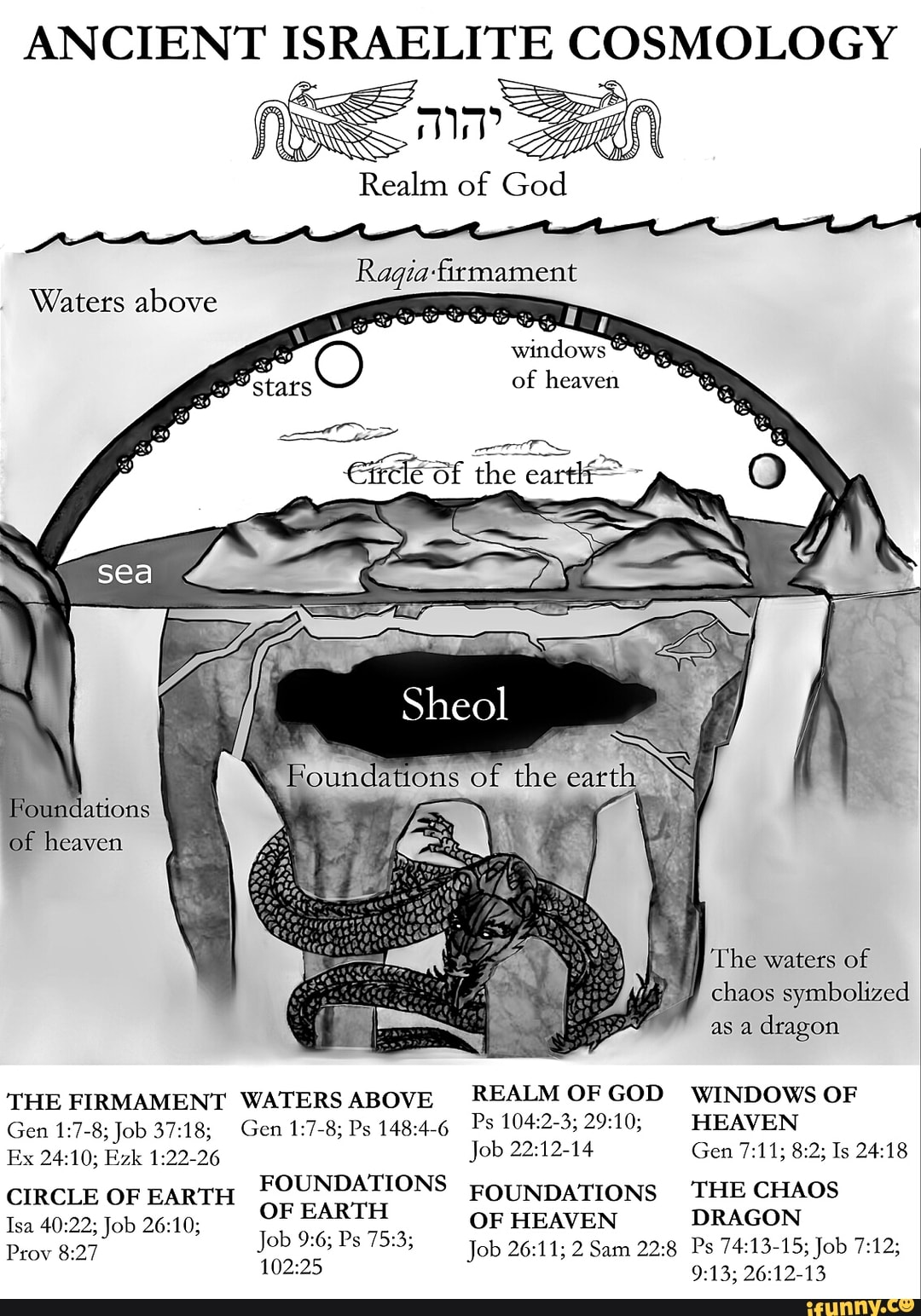|
Replies: 21
| visibility 2457
|
Top TigerNet [32158]
TigerPulse: 100%
55
|
A taste of the Documentary Hypothesis

3
Oct 18, 2024, 4:32 PM
|
|
The DH has been referred to several times in earlier posts, but I'm not sure anyone has ever posted it in action. This is from a book called The Bible, with Sources Revealed, that covers the DH.
The gist of the idea is that there were at one time two national stories of Israel, sort of the Yankee version of history and the Confederate version of history. Except in their case it was Judah and Israel.
After both histories had been written, a unifier (possibly Ezra) sought to bring both stories together. The possible merger runs all through the Torah, but since we've been on Noah lately, I'll post the shortened comparison of Genesis Chapters 6, 7 and 8. I think it's pretty amazing. Neither story discounts the other. They just provide complementary information from slightly different focuses. As one might expect a unifier to do.
Notice the things that are repeated twice:
1) Noah’s righteousness
2) Pairs of Animals
3) The Ark
4) a 7-day grace period
5) 40 days and 40 nights of rain
6) Noah’s age
And what’s different…
1)2 pair vs 8 pair
2)Noah’s sons are named only in version 1; in version 2 they are just his ‘family’
3) Sacrifice is unmentioned in version 1, but is in version 2 (hence 8 pairs?)
There’s a good deal more to it. This is just the simplified post version. But it’s pretty interesting, and can be read as either one, or as two, stand-alone stories. Try reading JUST the normal text first, and then JUST the italicized, and then both together, as they are presented in Genesis.
Genesis 6:9 Noah was a righteous man…
10 Noah had three sons: Shem, Ham and Japheth.
11 Now the earth was corrupt in God’s sight…
12 God saw how corrupt the earth had become…
13 So God said to Noah, “I am going to put an end to all people...
14 So make yourself an ark…
17 I am going to bring floodwaters on the earth….
18 But I will establish my covenant with you, and you will enter the ark…
19 You are to bring into the ark two of all living creatures, male and female, to keep them alive with you.
20 Two of every kind of bird, of every kind of animal…
21 You are to take every kind of food that is to be eaten…
22 Noah did everything just as God commanded him.
Genesis 7:1 The Lord then said to Noah, “Go into the ark, you and your whole family, because I have found you righteous in this generation.
2 Take with you seven pairs of every kind of clean animal, a male and its mate, and one pair of every kind of unclean animal, a male and its mate,
3 and also seven pairs of every kind of bird, male and female, to keep their various kinds alive throughout the earth.
4 Seven days from now I will send rain on the earth for forty days and forty nights, and I will wipe from the face of the earth every living creature I have made.”
5 And Noah did all that the Lord commanded him.
6 Noah was six hundred years old when the floodwaters came on the earth.
7 And Noah and his sons and his wife and his sons’ wives entered the ark to escape the waters of the flood.
8 Pairs of clean and unclean animals, of birds and of all creatures that move along the ground,
9 male and female, came to Noah and entered the ark, as God had commanded Noah.
10 And after the seven days the floodwaters came on the earth.
11 In the six hundredth year of Noah’s life… the floodgates of the heavens were opened.
12 And rain fell on the earth forty days and forty nights.
13 On that very day Noah and his sons, Shem, Ham and Japheth…entered the ark.
14 They had with them every wild animal according to its kind…
15 Pairs of all creatures that have the breath of life in them came to Noah and entered the ark.
16 The animals going in were male and female of every living thing, as God had commanded Noah. Then the Lord shut him in.
17 For forty days the flood kept coming on the earth…
18 The waters rose and increased greatly on the earth…
19 They rose greatly on the earth…
20 The waters rose…
21 Every living thing that moved on land perished—birds, livestock, wild animals, all the creatures that swarm over the earth, and all mankind.
22 Everything on dry land that had the breath of life in its nostrils died.
23 Every living thing on the face of the earth was wiped out…
24 The waters flooded the earth for a hundred and fifty days.
Genesis 8:1 But God remembered Noah and all the wild animals and the livestock that were with him in the ark…
2 Now the springs of the deep and the floodgates of the heavens had been closed…
3 The water receded steadily from the earth.
15 Then God said to Noah,
16 “Come out of the ark, you and your wife and your sons and their wives.
17 Bring out every kind of living creature that is with you…
18 So Noah came out, together with his sons and his wife and his sons’ wives.
19 All the animals and all the creatures that move along the ground and all the birds…
20 Then Noah built an altar to the Lord and, taking some of all the clean animals and clean birds, he sacrificed burnt offerings on it.
|
|
|
|
 |
Top TigerNet [32158]
TigerPulse: 100%
55
|
Re: A taste of the Documentary Hypothesis

2
Oct 18, 2024, 4:37 PM
|
|
Here's a link for much more info...
https://zoboko.com/text/766n2163/the-bible-with-sources-revealed/1
The color-coded breakdown of the Torah begins at Chapter 7. Everything up to that is historical info, etc.
|
|
|
|
|
 |
Ultimate Clemson Legend [101827]
TigerPulse: 100%
64
Posts: 98886
Joined: 2009
|
IDK what to say.

1
Oct 18, 2024, 5:01 PM
|
|
If someone had unified the 4 gospels half of the R&P posters would be speechless in not having any conflicts between the 4 testimonies.
I think of stuff like this as being from different perspectives. A man with a small female child might notice a family of all boys except for that one daughter. It's all common sense and you are one of the few who point out inconsistencies out of respect for different backgrounds of the writers which cause greatly differing perspectives.
I appreciate you.
|
|
|
|
|
 |
Top TigerNet [32158]
TigerPulse: 100%
55
|
|
|
|
|
 |
Ultimate Clemson Legend [101827]
TigerPulse: 100%
64
Posts: 98886
Joined: 2009
|
I think we have to watch out for scripture written during the diaspora.

1
Oct 18, 2024, 5:30 PM
|
|
The conquering kings always allowed the prophets to work and some even sought their advice. Yet, still the prophets' works was overseen by earthly authorities so the tone and terms are necessarily different.
No, I have no examples.
|
|
|
|
|
 |
Top TigerNet [32158]
TigerPulse: 100%
55
|
Re: I think we have to watch out for scripture written during the diaspora.

1
Oct 18, 2024, 6:19 PM
|
|
Yes, you can find that exactly in Chronicles and Kings if you read them at the same time. They're not merged stories, like some of the Torah may be, but they are parallel stories.
It's quite interesting to see how one author spoke of say, King Whoever, verses how another told the same story. Not that they are radically different or even contradictory, but simply that one author talks about maybe his social programs, and the other praises his military victories, or whatever.
Simply two perspectives, as you said.
|
|
|
|
|
 |
Dynasty Maker [3484]
TigerPulse: 78%
34
|
Re: A taste of the Documentary Hypothesis
Oct 19, 2024, 12:02 PM
|
|
Seems like a pretty straightforward reading to me. Nothing to see here. Moving on.
-CUintulsa®
|
|
|
|
|
 |
Clemson Icon [25922]
TigerPulse: 100%
54
Posts: 14795
Joined: 2001
|
Just to be clear:

1
Oct 19, 2024, 7:25 PM
|
|
Are you proposing that JEDP is the generally accepted explanation for the differences in style and detail? Those things should be pointed out, and are fun to discuss, have been for centuries. You mention DH, which of course is JEDP. Are you saying that is where the Torah came from?
Message was edited by: CUintulsa®
|
|
|
|
|
 |
Top TigerNet [32158]
TigerPulse: 100%
55
|
Re: Just to be clear:

3
Oct 19, 2024, 9:04 PM
|
|
>Are you saying that is where the Torah came from?
Well no, I can't say that, lol. I wasn't there.
But I do think it is one of many interesting possibilities, with some compelling evidence to be considered. Since it's one of the older hypotheses (at least as far as textual analysis goes), I presented it as my "taste of" example.
But the term Documentary Hypothesis represents a specific idea, and newer ideas have some up since the DH. All propose multiple sources make up the Torah, they just differ in 'who' and 'how' and 'when.' The big three are 1) the Documentary, 2) the Supplemental, and 3) the Fragmentary hypotheses.
One primary difference hinges on the existence of the Elohim (E) source. All three accept the text differences between the Jahweh (J) source, the Priestly (P), and the Deuteronomist (D) sources. So in effect the Documentary thinks it was JEPD, and the Supplementary and Fragmentary think it was only JPD.
Another thing that makes the DH specific is that it proposes that the J and E sources were essentially equal. In my example I used the Union and Confederate analogy. The Supplementary presumes the J was sort of a primary spine, and bits of P and D were added on. And the Fragmentary proposes sort of a pot of available texts, that were just cobbled together after the fact. Here's some nice graphics:
This is a simple version of the DH:

This one is a more complex DH:

This is a version of the Supplementary

The Fragmentary Hypothesis

Each of the three ideas have strong points and weaknesses. But, aside from someone sitting down and writing the whole Torah from front to back, it had to be assembled, or added to, in some fashion. The question is, "Who, when, and how?"
|
|
|
|
|
 |
Clemson Icon [25922]
TigerPulse: 100%
54
Posts: 14795
Joined: 2001
|
Re: Just to be clear:

1
Oct 20, 2024, 12:51 AM
|
|
> "Well no, I can't say that, lol. I wasn't there."
Ha, yes, I assumed as much, though with little evidence. However, your earlier comments were about different stories abutting, creating different accounts merely 50 words apart - which of course could be the case - and here you seem to attribute this to JEDP. I am asking if that is what you are saying.
I am sure you know that that idea now has some problems, though the idea of different sources existing for the Torah doesnt seem controversial to me. For instance - and this is not an exact analogy - while we have no good reason to think Luke didnt write Luke/Acts, his Gospel obviously used some of the same sources as Matt and Mark. Sources and authorship are two different subjects. Sure, some of the Torah sources are claimed to be later than Moses, but the dating question isnt closed at all. Granted, aside from Jesus's comments, there is little direct evidence Moses 'wrote' the Torah ... except Deuteronomy, for which there is good evidence for Moses, so there is that.
While 'sources' and 'authorship' are two different matters, so are 'sources' and 'stories'. Different sources with different details do not mean different stories. 'Multiple sources' and 'authoritative' are also different subjects, and neither discounts the other: one would hope a biography would use multiple sources. That is why I am asking these questions about what you are proposing.
Does all this matter? I'll get the picky part out of the way and say that "2 pair" sitting right on top of "7 of clean" is thin evidence of conflicting stories, even if there were two sources. But beyond that, does it matter?
The only thing that matters is authenticity/authority, would you agree? If that is what matters, JEPD doesnt seem to get us closer to that. I agree that authority should be examined, but isnt the important question how to do that?
Message was edited by: CUintulsa®
|
|
|
|
|
 |
Top TigerNet [32158]
TigerPulse: 100%
55
|
Re: Just to be clear:

3
Oct 20, 2024, 2:20 AM
|
|
> and here you seem to attribute this to JEDP. I am asking if that is what you are saying.
Yes, the example I posted is JEDP, but it's an updated, 2000ish version of the older one, which goes back to the 1880's I believe. It tries to incorporate a greater understanding of ancient Israel from the Dead Sea scrolls, Nag Hammadi Library, etc. Basically, anything we've learned since the 1880's and the original DH. And yes, I’m aware that none of the three primary theories are complete. But, I find them all interesting attempts to answer some of the curiosities in the way the Torah was composed.
In the example I presented, I think the plain text would be 'E', and the italicized text would be 'J'. Or I might have them reversed.
>Different sources with different details do not mean different stories.
Agreed. Specific details aside, for me, the more curious question would then be "Why tell the same story back-to-back?" as in Genesis 1 and 2, or interwoven, as Gen 6,7,8, appears to do. What I mean is, if an author, or even a redactor, had all the information available to him, why structure the story in such a parallel way? DH gives an interesting possibility as to why that might be, as do the other options.
The same question would apply to the Gen creation story. Why tell it twice, as opposed to just once, incorporating all the details in chronological order? The only reason I can think of is that for some reason, the author wanted, or needed, to tell it two ways, or to include two versions. And, if the author questioned one version or the other, why not cut the more 'questionable' one? For example:
Gen 1:1 “In the beginning God created the heavens and the earth.”
And
Gen 2:4 “4 This is the account of the heavens and the earth when they were created.”
Why twice? And…
Gen 1:11 "Then God said, “Let the land produce vegetation..."
Gen 1:26 "Then God said, “Let us make mankind in our image..."
vs.
Gen 2:5 "Now no shrub had yet appeared on the earth..."
Gen 2:7 "Then the Lord God formed a man..."
In contrast, the Gospels make it very clear that that is 4 people's view of Jesus's ministry. No question about that. They even name their own books. So why the apparent difference in the OT? Idk.
>"2 pair" sitting right on top of "7 of clean" is thin evidence of conflicting stories
I'd agree if that was the only indication of merged stories. But as I read the extened passages, I see two merged stories more and more. That's just a personal interpretation.
>The only thing that matters is authenticity/authority, would you agree?
Well, as odd as it might sound, I'm not really concerned about the authenticity or the authority. I believe them both. That is, I trust that each story, if there are two, was 'true' to each author in the sense that that's how they heard it secondhand...assuming they weren't there personally watching Noah load up the ark, haha.
So I assume author E was told "2", and author J was told "8" by whoever told them the stories. My question is, why? And more curiously, if the redactor thought it was one of the other, why say it both ways?
And if it’s only one story, why present it in such a fragmented way?
|
|
|
|
|
 |
Clemson Icon [25922]
TigerPulse: 100%
54
Posts: 14795
Joined: 2001
|
Re: Just to be clear:

2
Oct 20, 2024, 2:49 PM
|
|
"I have some influence with the Marshall. Tell me what you need." -- Miss Kitty, when a stranger came into the Long Branch looking for Dillon.
Okay, yes, things like that are fun to discuss. Like the 2 pair vs 7 of clean: "Take 2 pair of every kind. You're also going to need to eat, on the journey and after, so take some extra clean ones." One document, two, I don't know. Doesn't seem to be an issue. I understand there are more examples than that, but I don't think you are proposing to discuss each one. Your bottom line question was at the end: "And if it’s only one story, why present it in such a fragmented way?" If you have a theory, let me know.
I see three possibilities:
1. There were several purely mythological origin stories floating around. By some process or person, they became a mash-up known as the Torah, itself being a myth.
2. The sources are accurate, with expected differences in detail. No one bothered to eliminate the differences. No way to know why but probably because all three are basically true. Similarly, I would tell your account of a hiking trip as you told it, and tell your wife's account as she told it, without changing either merely to unify details.
3. The sources are accurate, the apparent differences being additional detail, like the 2 pair vs 7.
IE, a false story will have inconsistencies. Inconsistencies do not themselves indicate a false story.
There are variations on those, but those seem to be the three. Lets say I could show to your satisfaction why (pick one) is true. What does that really tell you? It seems to me the only thing that matters is whether it is #1, or one of the other 2. Aside from that, what else is gained. So, this is not a debate question, but a conversational one: What is it you are actually wanting to know?
-----------
MissTulsa is comfortable with the understanding that I have remained faithful to her for decades in part because Miss Kitty is no longer available. Most people think that Amanda Blake, a smoker, died of cancer, and that was her preferred story, one that was accepted for many years. Not true. Her latest husband was not a great guy, and he died of AIDS. She did as well, a few years later. She was universally considered to be a straight arrow regarding sex and drugs. She almost certainly got it from him. Was kept on the down low for quite a while.
So, on one of our semi-annual trips from Tulsa to Fort Collins, we detoured to Dodge City, KS. Stayed overnight, went to the restored original city, rebuilt as true as possible to earliest photos. Much of it resembles the Dodge City of Gunsmoke. We went into the Long Branch, I leaned against the bar and looked out the front window. MissTulsa walked up to me and said, "I have some influence with the Marshall. What can I do for you?" Good times.
A lost person might indeed end up way off track in Dodge City rather than Ft Collins. Or, a person in Dodge City might be on his way to Ft Collins via an unexpected route.
|
|
|
|
|
 |
Top TigerNet [32158]
TigerPulse: 100%
55
|
Re: Just to be clear:

2
Oct 20, 2024, 9:56 PM
|
|
I agree that any of your three proposals could be the case. I'd lean towards a variation of #2, I think, based on the premise that there is often a kernel of truth at the bottom of most everything.
I don't think anyone just "makes things up" to make them up. My point being, why would a non-believer make up a story about a God they don't believe in? Why would they bother?
So the stories, to me, always come from devout believers. But, phenomenon might be attributed to God by a believer, accurately or inaccurately. That one is tougher to sus out.
For instance, were Helene and Marvin the direct result of God's hand, or, were they the random outcome of a weather system created by God, or, were they completely random events with no divine influence at all? That's pretty much the full range of possibilities.
So, is a flood common enough? Sure. Particularly in a flood plain like the Euphrates basin. Is using, or even building a boat to escape a flood common enough? Sure.
Could a real event be retold with the full belief that it happened one way, when in fact happened in another way? Sure. How many people retold Kitty's cancer story in complete honesty, because that's what they were told and they believed it, and then they retold it 'truthfully'?
>What is it you are actually wanting to know?
Well, for me, the interesting in this how people, both then and now, experience God. As I've mentioned before, about 95% of the planet senses 'something', but one can hardly find even two who agree on everything, lol. Sure, people say "I'm a Muslim, or I'm a Baptist, or I'm Sikh. At the highest level, they all sense something beyond the purely physical world.
But then, their experiences, and as a result, their beliefs, seem to vary more and more, until finally people are disagreeing over whether God wants wine or only grape juice at communion. And not that a single one of them is wrong. There is some reason they believe what they believe.
How all that ties back into Noah and two animals or eight animals, it seems to me there must be a specific reason for both mentions. I often ask myself "why is it this way and not that way?" For instance, the author of Genesis could have simply said:
"God told Noah to bring pairs of every animal aboard the ark."
But he didn't do that. He (or they) were very specific about numbers. That's a mystery to me. Because all ambiguity could have been taken out of the story by simply saying it differently.
At a higher level, one could ask "Why is this story even in the Bible at all?" When was the last time Jerusalem, in the Judean desert high up on Mt. Zion, flooded? But the lower Euphrates floods nearly every year, even to this day. So a story that makes perfect sense in Sumer or Babylon seems out of place in Jerusalem.
But, that story must have made sense to someone in order for it to be included in the OT. Someone had to say "Yeah, that happened to me once! I lost my home when it got swept away by water! I understand exactly what Noah went through."
Does a story like Noah's ark mean "God did it?" Idk. Maybe. Maybe not. I think the most we can say is that for the people who wrote it and included it, it absolutely did. But, with a very specific understanding, or understandings. And I like trying to understand what their understanding was.
++++++
And I thought your Dodge City story was great!
|
|
|
|
|
 |
Clemson Icon [25922]
TigerPulse: 100%
54
Posts: 14795
Joined: 2001
|
Re: Just to be clear:

1
Oct 21, 2024, 11:48 AM
|
|
You already know why the number of animals was specified. I forget how many women were aboard ... 4? And maybe they had kids, some of which were girls. So, unless somebody puts their foot down, you're going to be overrun with cats. And little apartment dogs. I'm sure Noah discussed this up front. "Okay, I'm with you, but I'm going to need some help with the pets. Frankly, I've been a little worried about Ham's wife already."
"No worries, I'll handle it."
Regarding the why of a flood, how the story is told, etc - and what follows is true of any of the Torah - there is a difference in beginning premise that will keep us from ever coming to satisfactory agreement, except to understand where we depart. I believe Jesus was God-on-earth, the culmination of a story that began with the discussion between God and mankind after the fall. To Satan, in mankind's hearing, God said, "You will bruise his heal, but he will crush your head." The following history of mankind is of God preparing us for that end result.
Why the story unfolded as it did, over that extent of time, and what it meant for people who lived in the interim period - including, of course, why a flood took place - are all great questions that are a separate discussion. Mankind's history was leading to Jesus, or it was not. If it was, the answers to those questions, while open to individual interpretation, must take that end into account. If not, all bets are off.
I start with the premise that this is the case. You do not (you might be open to the possibility, but that is not your starting point). That difference in starting point necessarily means we will look at some issues differently. Decades later someone can ask, "What in the world was MissTulsa doing way out in Dodge City, KS, the middle of nowhere?" Some can speculate about ultimate intent, destination, motivation, etc and etc. If someone else knows she was in Ft Collins a day later they can say, "I don't know. She was in time for the conference, so that is where she was headed. So, had to have been sightseeing of some nature, or maybe seeing a relative. But it was not her destination, whatever it was."
"And besides, one of them said they were there on a Friday, the other on a Saturday. Whatabout that?" Again, depends on whether one believes they were in Ft Collins by 8:00 Monday morning. If they were, who cares why one remembers it one way, one another. But if you don't assume a known ending, maybe the difference indicates a falsehood.
Another way to say it is maybe this: One can look at the Torah and try to understand truth from it via its sources, comparing it to one's own experiences, etc. Or one can know a superseding truth, and understand the Torah against it.
What causes discord, I think, is either person insisting on an answer to a whatabout that is independent of that assumed starting point. If both parties are able to recognize that irreconcilable difference - the assumed starting point - they can say, "Okay, we have two views of that, either being right depending on that starting point." The abortion battle rages because of that error, I think, with at least one side, maybe both, being unwilling to live with an irreconcilable starting point (whether a life is created at conception).
|
|
|
|
|
 |
Top TigerNet [32158]
TigerPulse: 100%
55
|
Re: Just to be clear:

1
Oct 21, 2024, 1:33 PM
|
|
I can agree with all that.
This is a complete non-sequitur, but what really caught my attention was your last sentence. This is not to start a debate on abortion, but since you brought the topic up.... ">">">">"> ">">">">">
I actually woke up in the middle of the night thinking about this. It might have been impacted by the fact that I was reading an article earlier on people cloning their favorite pets...cats, dogs, etc. Or maybe it was just a serendipitous occurrance.
Life is not so much the issue to me. I've got no problem saying life begins at conception. In fact, I think an argument could be made that eggs and/or sperm are alive even before they join. They are both cells, which are themselves living.
What woke me up was where the soul fits in. The Egyptians made a strong distinction between the 'life-force', whatever that is...the thing that makes us different from rocks, and the soul.
In these cloning efforts, fertilized cells are separated after they naturally begin to multiply and split. One egg is allowed to grow, one is put on hold till it's thawed out later. The same procedure is used in fertilization clinics for humans.
What woke me up was this question...does the soul split, half with each egg cell? Or, does the soul go with one or the other eggs? Does one soul live on while the other soul is frozen and waiting to be thawed out at a future date? Maybe every fertilized egg creates a new soul with it, even if they started from the same single egg?
And it can get even more complex. Maybe a completely new soul isn't created at conception. Maybe it's a merger of part of the man's soul and part of the woman's soul. Just like they share DNA.
That's all rhetorical and not meant to start a new conversation this deep in a thread. But it's the kind of thing that wakes me up from a sound sleep at 3:00. There's just so, so much we don't understand.
|
|
|
|
|
 |
Clemson Icon [25922]
TigerPulse: 100%
54
Posts: 14795
Joined: 2001
|
Re: Just to be clear:

1
Oct 21, 2024, 2:56 PM
|
|
Yes, the area of the unknown brings unanswerable questions. And, ha, no, we are not going to argue abortion. That is not actually your topic, or mine, but is instead how we accommodate differences in thought and in opinion.
A bunch of years ago I got to know the guy who did the first IVF in the US, at Old Dominion Univ. (The first in the world was in the UK.) By 'did the first', I mean he ran the lab that did it. A great guy to know and be around, and a good golfer, so there you go. He is a Christian, and was sometimes asked how he morally handled the destruction of unused embryos. His answer was that in any attempt to become pregnant, there is going to be lost embryos, naturally or not, a necessary part of the process. I don't know if he actually said it like this, but what I remember is something like 'God handles the naturally lost ones, and He will handle these.' That is by no means a quote, but a sense of what I heard.
However, a couple who is close to me is trying to get pregnant right now, and the chances are slim. I asked about IVF and both said they had rejected that alternative for exactly the above reason. They said, "We can't do an abortion because it is taking a human life, so we can't do IVF, either. We want to have children, but if this imperfection has been allowed, obviously our happiness is founded on something bigger than having children." I respect that consistent application of a starting point. I also know that the above Doc is equally firm in his conviction. I would side with the young couple if I had to choose, but that is not the point here.
If abortion is the debate, it seems to me the landing point can't be who wins, but how to accommodate the irreconcilable starting points that prevent identifying a winner. So, biblical discussions have to reach a similar inconclusive answer, stopping at the point of irreconcilable premises. Those premises can be and should be discussed as separate subjects.
|
|
|
|
|
 |
Top TigerNet [32158]
TigerPulse: 100%
55
|
Re: Just to be clear:

1
Oct 21, 2024, 3:06 PM
|
|
Well said
|
|
|
|
|
 |
Dynasty Maker [3484]
TigerPulse: 78%
34
|
Re: Just to be clear:

1
Oct 22, 2024, 12:17 PM
[ in reply to Re: Just to be clear: ] |
|
"1. There were several purely mythological origin stories floating around. By some process or person, they became a mash-up known as the Torah, itself being a myth."
Or, the Torah contains some actual history with mythological elements added to it. Fordtunate Son often says that he doesn't think these writers were making things up, however the embellishments can be subtle.
A shepherd boy may very well have killed someone from an opposing army. Did he do it with a slingshot and a stone and was the man a 9 ft giant? Probably not.
Did the early Israelites escape captivity in Egypt? No reason to doubt that. Did they do it after their leader parted the Red Sea with a staff and the entire Egyptian army drowned? I'm sure Egyptian history just forgot about their entire army being destroyed in this event.
How do you explain all the other creation stories (we will call them stories instead of myths to be fair since you refuse to label Genesis as such) that have similarities to Genesis? Either one copied the other or they can both be traced to a common source.
|
|
|
|
|
 |
Dynasty Maker [3484]
TigerPulse: 78%
34
|
Re: A taste of the Documentary Hypothesis

1
Oct 22, 2024, 9:15 AM
|
|
Lot of interesting things after reading up a little more on this documentary hypothesis.
I've posted before about there being an early distinction between "El" and "Yahweh". Genesis 1 uses the term EL while the creation account in Genesis 2 uses Yahweh. Of course the english translations just use the term "God". Is this a little bit misleading? I guess they both refer to a supreme being, albeit different deities technically.
Also, there seem to be bits and pieces of different creation myths or whatever you want to call them spread throughout the Old Testament in Isaiah, Job, and Psalms, containing stories of god defeating giant sea monsters.
The Genesis writers reflect ancient ideas and align itself with tradition Babylonian science. The earth is a flat disc shape with the heavens above and waters below. God himself warns against worshipping these sea creatures in Exodus 20:4- "You shall not make for yourself an image in the form of anything in heaven above or on the earth beneath or in the waters below. 5 You shall not bow down to them or worship them; for I, the Lord your God, am a jealous God, punishing the children for the sin of the parents to the third and fourth generation of those who hate me, 6 but showing love to a thousand generations of those who love me and keep my commandments."
|
|
|
|
|
 |
Top TigerNet [32158]
TigerPulse: 100%
55
|
Re: A taste of the Documentary Hypothesis

1
Oct 22, 2024, 11:15 AM
|
|
>containing stories of god defeating giant sea monsters.
That's actually a big part of the Sumerian/Babylonian creation story. For them, it seems that overcoming chaos with order was the big deal, which one might expect from the first city dwellers. Gotta have order to maintain a city. I'll post their creation story some time. It's a good, quick read.
>The Genesis writers reflect ancient ideas and align itself with tradition Babylonian science.
Yep. God hovering over the 'waters' reflects their cosmology perfectly. Chaotic monsters lurked in those waters, which had to be defeated. For us it seems a little mystical maybe, but for them it was basic, agreed-on science.
Gen 1:1 "...and the Spirit of God was hovering over the waters."
Note that God doesn't create the waters. They are there as long as he is.
This is apparently how they saw their universe, based on the description in Genesis

Remember too that Abram came from Ur...in Sumeria. That's where the Hebrew roots lead right back to according to their texts. So it's not surprising to me that their world-view would mirror in some ways a Euphrates/Tigris basin world-view. And that some of their stories, like floods, and the quest for immortality, and big fish/sea monsters, would be similar as well.
Not many floods in Jericho. Whole lotta floods in Ur.

|
|
|
|
|
 |
Dynasty Maker [3484]
TigerPulse: 78%
34
|
Re: A taste of the Documentary Hypothesis

1
Oct 22, 2024, 11:57 AM
|
|
"
Gen 1:1 "...and the Spirit of God was hovering over the waters."
Note that God doesn't create the waters. They are there as long as he is."
A couple things come to mind from this...
1. Like you said god doesn't create the waters...they are already there. Also, it says "in the beginning". The beginning of what? The universe? Time? What was going on before that and for how long? How did the water get there? Did god create it or did it exist alongside god? Who created god?
2. "the spirit of god was hovering over the waters"- This would seem to indicate that god's spirit was actually present physically just like the water, before the creation of the universe. So at least the material world already existed prior to creation, which would seem to blow the theory that god created time space and matter and is not bound by those things out of the water.
|
|
|
|
|
 |
Top TigerNet [32158]
TigerPulse: 100%
55
|
Re: A taste of the Documentary Hypothesis

1
Oct 22, 2024, 3:31 PM
|
|
I'm not sure the Hebrews even had a creation story for a lot of their existence. That is, since Abram came from Ur, he probably believed in their creation story. I'll dig it up and post it sometime.
The Hebrew version might not have been put to paper until the Exile in 586ish BCE. That's maybe 1000 years after he left Ur. Some story probably existed in that interim, but it may have only been oral. Of course, who knows what ancient tablets might be dug up from the sands on any given day to change our understanding of history?
Some of those ancient stories make more sense given geographic conditions. For instance, a chaotic flood story would probably have made an ancient Egyptian say, "What? The Nile flows like a clock every year, and has for centuries. It's as predictable and regular as the sunrise and sunset. But a Meso would have said "Oh, I get it. Every other year is a flood disaster for us."
Similarly, to a culture that started at the mouth of the Nile, or at the mouth of the Euphrates, seeing life start in water is a natural. But in Israel, there is the Jordan River and the Dead Sea. Not much life originating out of the Dead Sea, you know.
So some of the Hebrew stories don't quite feel geologically appropriate...maybe they were imported. One would think that after 400 years of captivity in Egypt there would be a great deal of influence from there. There is some I think, but there seems to be at least as much, and maybe more from Meso.
|
|
|
|
|
|
Replies: 21
| visibility 2457
|
|
|
 to award
the award.
to award
the award.














